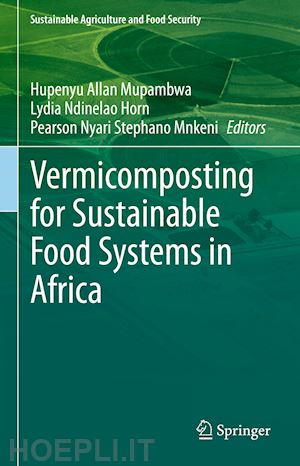
Questo prodotto usufruisce delle SPEDIZIONI GRATIS
selezionando l'opzione Corriere Veloce in fase di ordine.
Pagabile anche con Carta della cultura giovani e del merito, 18App Bonus Cultura e Carta del Docente
This edited book collates the research done mainly in Africa on vermicomposting and related technologies that can assist African smallholder farmers in making nutrient rich organic fertilizers from their animal and crop residue wastes. Information on the development of organic sources of liquid fertilizer development for hydroponics is also presented. The book presents research findings on vermicomposting in a simplified way that will allow farmers and extension workers to adopt the indicated technologies. The book also covers critical aspects of standardization of vermicompost preparation, earthworm biology, nutrient enrichment of composts and organic liquid fertilizer production.
Vermicomposting is a technology that employs earthworms to enhance the biodegradation and fertilizer value of organic wastes. The earthworms optimize the biodegradation ecosystem during composting, resulting in a final nutrient rich product with more recalcitrant forms of carbon and much lower levels of veterinary antibiotics and their metabolites. Vermicompost as an organic fertilizer is highly preferred over other forms of soil enhancers. A lot of research has been done on vermicompost and related activities in Africa but remain scattered across various publications.The book is an invaluable source of information for farmers especially those practicing organic crop production, vermicomposting researchers, as well as extension workers.
Hupenyu Allan MUPAMBWA
Hupenyu holds a PhD in Soil Science, where his research focused on vermicomposting as a waste beneficiation technology important in driving organic soil fertility. Currently, he leads the Desert and Coastal Agriculture research program at the University of Namibia. He has more than 14 years’ experience in agriculture research and training as well as university undergraduate and postgraduate teaching and research. He has published more than 25 peer reviewed international publications, 11 book chapters and edited 1 book. His research focuses on waste beneficiation, vermi-technology, and organic soil fertility management with a drive towards improving the soil quality among resource poor farmers
Lydia Ndinelao HORN
Lydia is a Research Coordinator at the Multidisciplinary Research Services (MRS) Department, University of Namibia (UNAM). She holds a BSc in Agriculture (Crop Science) and MSc in Biodiversity Management and Research from UNAM. She obtained a Ph.D. in Plant Breeding from the University of KwaZulu-Natal under the TC Africa sponsorship in promoting women in nuclear science and technology. As a plant breeder, her role in crop improvement using nuclear science and technology led to the development of Namibia’s first-ever mutant the development of the first-ever germplasms of cowpea, Bambara groundnut pearl millet, and sorghum.
Pearson Nyari Stephano MNKENI
Pearson worked as a professor of soil science at the University of Fort Hare (UFH), South Africa until his retirement in 2018. Before 1997, he served as an Associate Professor in Soil Science at the Sokoine University of Agriculture in Morogoro, Tanzania. He is presently Dean of Science and Technology and Acting Deputy Vice Chancellor for Planning, Administrationand Finance at the University of Arusha, Tanzania. His research focus has been on ways of improving soil fertility using ecological approaches that minimize thecarbon, energy and water footprints of crop production. He initiated and led climate smart agriculture research at UFH. He led the development of climate-smart agriculture guidelines for South Africa as a consultant for the United Nations Environmental Programme (UNEP) in 2018. He has published over 90 articles and is ranked as an established researcher by the National Research Foundation of South Africa.











Il sito utilizza cookie ed altri strumenti di tracciamento che raccolgono informazioni dal dispositivo dell’utente. Oltre ai cookie tecnici ed analitici aggregati, strettamente necessari per il funzionamento di questo sito web, previo consenso dell’utente possono essere installati cookie di profilazione e marketing e cookie dei social media. Cliccando su “Accetto tutti i cookie” saranno attivate tutte le categorie di cookie. Per accettare solo deterninate categorie di cookie, cliccare invece su “Impostazioni cookie”. Chiudendo il banner o continuando a navigare saranno installati solo cookie tecnici. Per maggiori dettagli, consultare la Cookie Policy.